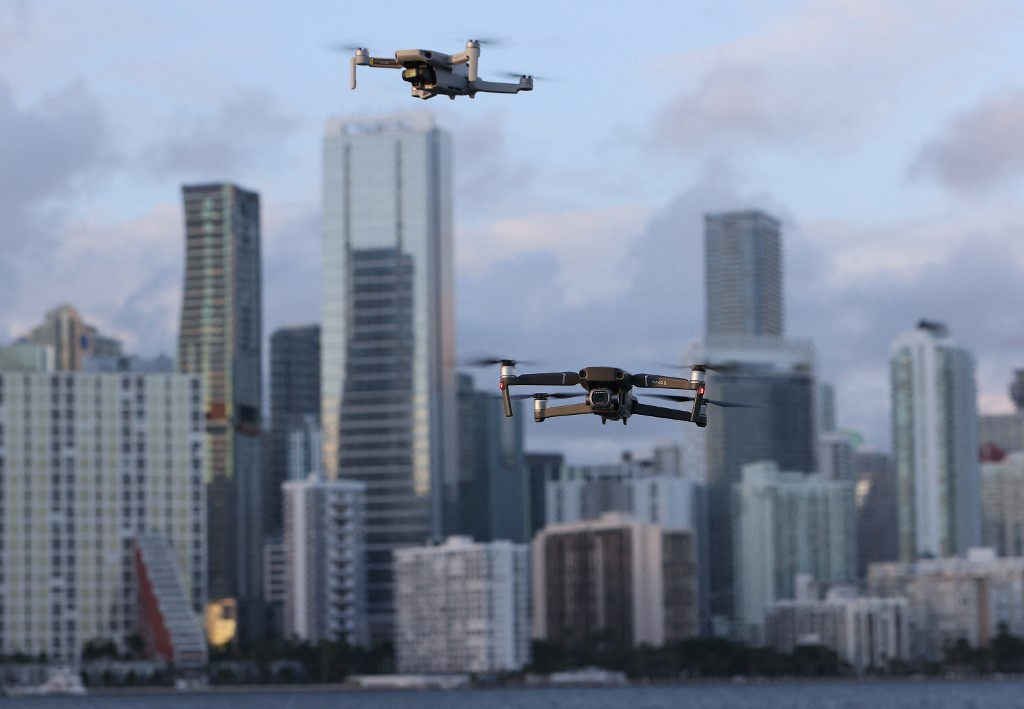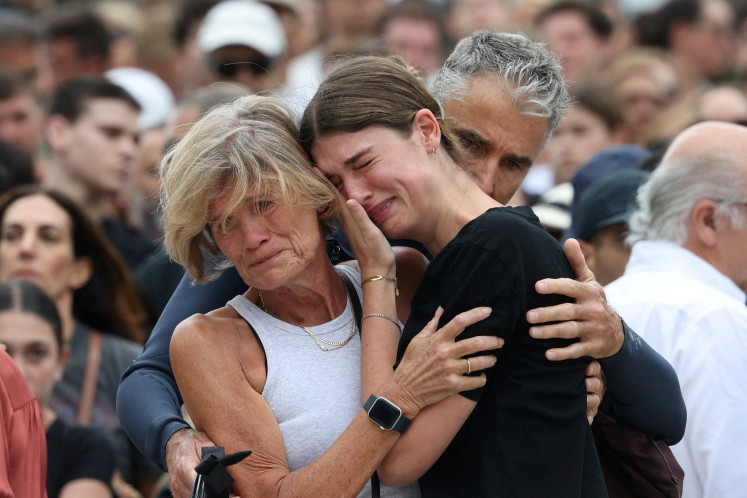Popular Reads
Top Results
Can't find what you're looking for?
View all search resultsPopular Reads
Top Results
Can't find what you're looking for?
View all search resultsChina's high-flying drone giant DJI in US cross-hairs
Company lore traces DJI's birth to the college dorm room of Wang Tao, also known as Frank Wang, then a student at Hong Kong University of Science and Technology in the early 2000s.
Change text size
Gift Premium Articles
to Anyone
 In this photo illustration, a DJI Mavic 2 Pro and DJi Mavic Mini made by the Chinese drone maker fly near each other on December 15, 2021 in Miami, Florida, US. Reports indicate that the world’s leading drone maker, DJI, is among eight Chinese companies expected to be placed on a US government blacklist that prohibits businesses operating in the US from exporting technology to companies. (AFP/Getty Images/Joe Raedle)
In this photo illustration, a DJI Mavic 2 Pro and DJi Mavic Mini made by the Chinese drone maker fly near each other on December 15, 2021 in Miami, Florida, US. Reports indicate that the world’s leading drone maker, DJI, is among eight Chinese companies expected to be placed on a US government blacklist that prohibits businesses operating in the US from exporting technology to companies. (AFP/Getty Images/Joe Raedle)
Chinese drone-maker DJI is easily the highest-profile company targeted in a new round of US economic sanctions against companies over China's treatment of its Muslim Uyghur minority.
Following are key facts about Shenzhen DJI Sciences and Technologies Ltd, better known around the world by drone users simply as DJI.
Born in a dorm
Company lore traces DJI's birth to the college dorm room of Wang Tao, also known as Frank Wang, then a student at Hong Kong University of Science and Technology in the early 2000s.
Wang, who hails from eastern China and rarely speaks to the media, is now thought to be around 40 years old.
He reportedly fashioned his first prototype components in his dorm before going on to found DJI in 2006 in Shenzhen, the southern Chinese city near Hong Kong often cited as "China's Silicon Valley" due to the prevalence of high-tech enterprises.
Taking off
DJI grew rapidly from 2010 onward and became the world's biggest maker of consumer drones by 2015, going on to also capture a large global share of higher-end unmanned aerial vehicles (UAVs).
Its UAVs have been praised globally for rapid innovations that have helped push the worldwide explosion in drone use for everything from aerial photography to film-making, crop-dusting, search and rescue operations, and public-safety applications.
DJI is now the world's undisputed drone king, with an estimated 70-80 percent of the global market as of 2020, according to various industry trackers, and estimated annual revenues of around $3 billion.
Forbes magazine estimated Wang's net worth last year at $4.8 billion while corporate wealth-ranking outfit Hurun said the company was worth $15 billion in 2020.
Growing scrutiny
DJI's success seemed destined to irk the United States, which has grown increasingly concerned over potential security threats posed by Chinese tech companies.
Millions of American hobbyists use DJI drones, as have various US government agencies for tasks ranging from monitoring power facilities to counting wildlife and military use.
That raised the specter of a Chinese company capturing oceans of potentially sensitive US imagery and data.
Such concerns intensified after Beijing passed a law in 2017 that compels Chinese companies to hand over information they compile to state security organs, including data gathered overseas.
A number of independent tech-research companies have analyzed DJI's software in recent years, several of which claim to have found alleged security holes.
DJI has repeatedly denied any nefarious intent and has responded with various updates and patches.
Grounded
Pressure on DJI increased after the 2016 election of former US president Donald Trump, who escalated trade-and-technology competition with China, and as international concern mounted over Beijing's alleged repression of Uyghurs.
The Pentagon banned military use of DJI drones in 2017, with other agencies taking similar steps, and the Department of Homeland Security formally warned of a security risk from Chinese UAVs two years later.
In December 2020 the Trump administration restricted exports of US technology to dozens of Chinese companies including DJI over their alleged ties to China's military and security apparatus.
DJI was among companies the US accused of enabling "wide-scale human rights abuses within China" through data collection and the export of technology to "repressive regimes".
DJI responded at the time by saying it had "done nothing to justify" such accusations.
What's next?
Thursday's US announcement criminalizes investments and contact with DJI and the other sanctioned companies, and the case of Chinese telecoms giant Huawei shows that such moves have real bite.
Alleging close links between Huawei and the Chinese government, Washington has identified the world's biggest supplier of telecoms network gear as a potential Chinese espionage threat.
Under Trump, Huawei was barred from acquiring crucial US technology like microchips and cut off from using Google's Android operating system in its smartphones.
US allies have also been pressured to ban or rip out Huawei gear from their telecoms systems.
Huawei's smartphone sales and overall revenues have fallen as a result, forcing it to quickly pivot into new business lines including software, enterprise computing, and intelligent-vehicle technology.









